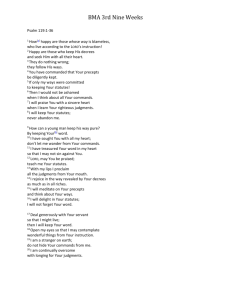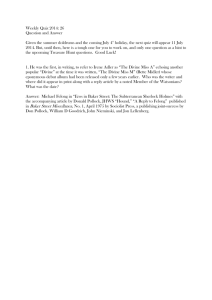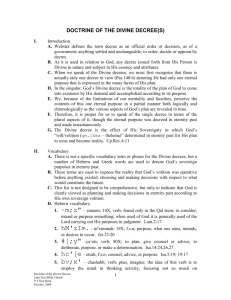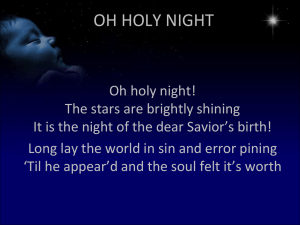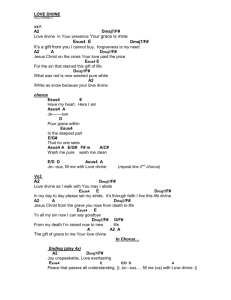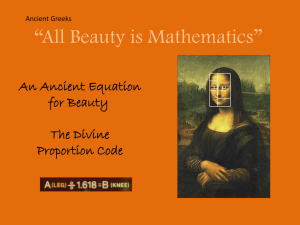DOCTRINE OF THE DIVINE DECREES
advertisement
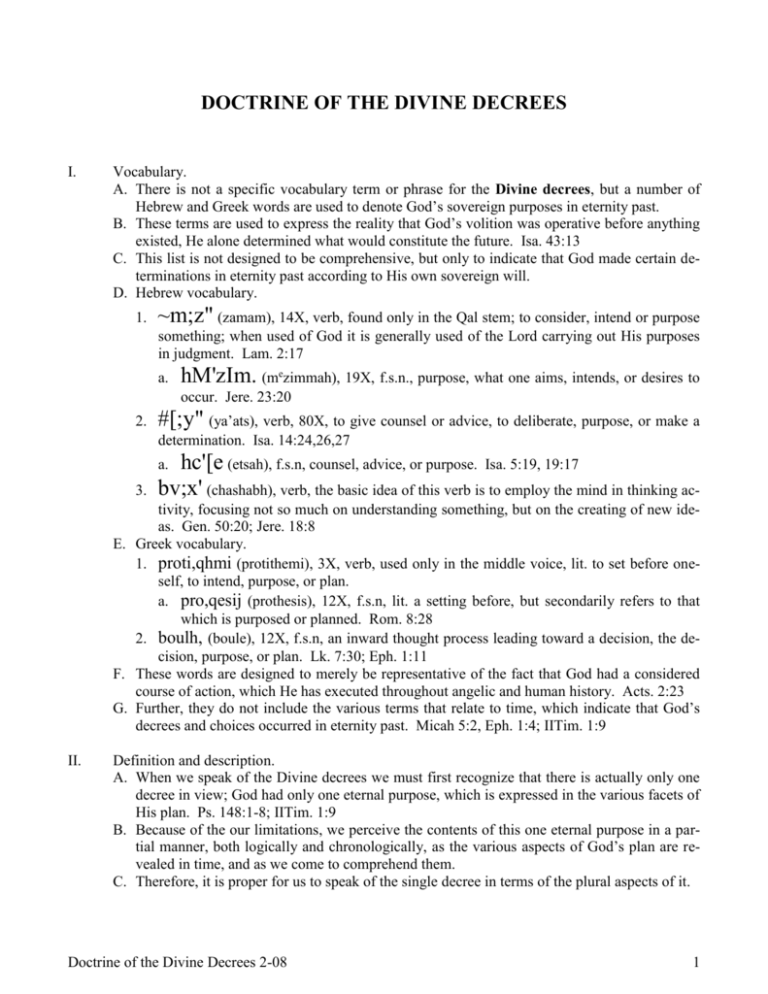
DOCTRINE OF THE DIVINE DECREES I. Vocabulary. A. There is not a specific vocabulary term or phrase for the Divine decrees, but a number of Hebrew and Greek words are used to denote God’s sovereign purposes in eternity past. B. These terms are used to express the reality that God’s volition was operative before anything existed, He alone determined what would constitute the future. Isa. 43:13 C. This list is not designed to be comprehensive, but only to indicate that God made certain determinations in eternity past according to His own sovereign will. D. Hebrew vocabulary. 1. ~m;z" (zamam), 14X, verb, found only in the Qal stem; to consider, intend or purpose something; when used of God it is generally used of the Lord carrying out His purposes in judgment. Lam. 2:17 a. hM'zIm. (mezimmah), 19X, f.s.n., purpose, what one aims, intends, or desires to occur. Jere. 23:20 2. #[;y" (ya’ats), verb, 80X, to give counsel or advice, to deliberate, purpose, or make a determination. Isa. 14:24,26,27 hc'[e (etsah), f.s.n, counsel, advice, or purpose. Isa. 5:19, 19:17 bv;x' (chashabh), verb, the basic idea of this verb is to employ the mind in thinking aca. 3. tivity, focusing not so much on understanding something, but on the creating of new ideas. Gen. 50:20; Jere. 18:8 E. Greek vocabulary. 1. proti,qhmi (protithemi), 3X, verb, used only in the middle voice, lit. to set before oneself, to intend, purpose, or plan. a. pro,qesij (prothesis), 12X, f.s.n, lit. a setting before, but secondarily refers to that which is purposed or planned. Rom. 8:28 2. boulh, (boule), 12X, f.s.n, an inward thought process leading toward a decision, the decision, purpose, or plan. Lk. 7:30; Eph. 1:11 F. These words are designed to merely be representative of the fact that God had a considered course of action, which He has executed throughout angelic and human history. Acts. 2:23 G. Further, they do not include the various terms that relate to time, which indicate that God’s decrees and choices occurred in eternity past. Micah 5:2, Eph. 1:4; IITim. 1:9 II. Definition and description. A. When we speak of the Divine decrees we must first recognize that there is actually only one decree in view; God had only one eternal purpose, which is expressed in the various facets of His plan. Ps. 148:1-8; IITim. 1:9 B. Because of the our limitations, we perceive the contents of this one eternal purpose in a partial manner, both logically and chronologically, as the various aspects of God’s plan are revealed in time, and as we come to comprehend them. C. Therefore, it is proper for us to speak of the single decree in terms of the plural aspects of it. Doctrine of the Divine Decrees 2-08 1 D. The decree of God is eternal (it always existed with Him), holy (righteous and just), wise (having all the facts), immutable (it cannot change or be changed), and expressed His sovereign purpose. E. God did not decree His own existence, since God existed prior to the decrees; therefore, He is not subject to the decrees, they are subject to Him. F. Since we are creatures of time and logic (a normal mind should think according to logical and chronological progression), we can only perceive the various aspects of the one decree in stages, although the various aspects of that decree were determined in eternity past. G. The Divine decrees are God’s eternal and immutable will regarding the future existence of all creatures and events, which also includes the precise manner and order of their occurrence. H. God determined that all that exists would exist; thus, making certain that all the events of the universe would occur, including angelic and human history—past, present, and future. I. The Divine decrees have five definite characteristics. 1. The decrees are entirely comprehensive; this means that there is not the slightest uncertainty as to one of the smallest or most insignificant events, since this would bring the entire plan of God into question as to its perfection. Matt. 10:29-30 Everything we think, why we think it, the environment in which we think it, as well as all the causes and effects that stem from that thinking were all known to God in eternity past. 2. The decrees are eternal; since God is perfect, He does not gain knowledge, but always knew everything that ever was or will be; this includes their causes (how they got there), their conditions (present status), successions (interaction with others in your environment that leads to decisions and change), and relations (how everything and everyone relates to each other). 3. The decrees are perfect; we recognize that the perfection of the decrees stems from the perfect nature of God Himself. We further recognize that they include and allow for sin-all the realities that stem from rebellion against God. 4. The decrees are immutable; nothing can possibly happen that would necessitate a change to the plan of God, since God always has perfect knowledge of all things. Job 37:16; Mal. 3:6 5. The decrees constitute the choice of sovereignty in eternity past; since God was not bound to choose a particular course of action, He formed His plan by His own sovereign volition. J. One must make a distinction between God’s eternal decrees and God’s laws, since one is related to eternity past and one is related to time. 1. The Laws of Divine Establishment are designed to set the standards for human conduct; they are established for the benefit and well-being of the human race. 2. The Laws of Divine Establishment are here to protect and perpetuate the human race; a key purpose for the law of nationalism is to provide every human being the freedom to believe on Christ and grow spiritually without interference or coercion. Acts 17:26-27 3. While men can violate God’s laws in time, they cannot violate the eternal decrees because any decision they might make was already known in eternity past and was included in the decrees. Doctrine of the Divine Decrees 2-08 2 III. The purposes of the Divine decrees are related to the pleasure and glory of God. A. The Divine decrees are the sovereign choice of God’s will, by which all things were brought into being, sustained, and ultimately subjected them to His sovereign will. Isa. 46:10 B. Since the Father, Son, and Holy Spirit pre-existed all things, they formulated a plan that included two distinct concepts. C. The first concept has to do with the pleasure of God, which is considerably more broad in scope than the limitations of pleasure with which we are familiar. Isa. 46:10; Phil. 2:13 D. While we do a variety of things to bring pleasure to ourselves, God’s pleasure is not nearly as impulsive or frivolous as ours; nevertheless, it was God’s pleasure to create all things, and in the following order. 1. The first wave of creation included a finite but exceedingly large company of angels, each with his own spiritual body, volition, personality, name, etc. IKings 22:19-20; Neh. 9:6; Job38:7 2. Secondly, He created billions and billions of light years of space, which is apparently still expanding according to His decree, along with one particularly habitable planet. Gen. 1:1 3. Third, He created and continues to create mankind, in order to resolve the issues of the angelic conflict, and to demonstrate the righteousness of God’s plan to all. E. Since God possesses absolute happiness at all times as part of His essence, it would be incorrect to think that all this activity increased His level of pleasure; it would be more accurate to say that all this proceeded from the source of His pleasure. Col. 1:19 F. The second factor that must be considered in this matter is that God acts on behalf of His perfect glory, which is unique to Him, and which He will not share. Isa. 42:8, 48:9-11 G. While this can be an undesirable quality in created beings, the absolute integrity of the Divine essence dictates that God act on behalf of His own glory. Isa. 42:8 H. When we speak of the glory of God, we must distinguish between His intrinsic glory and the extrinsic glory that comes to Him from His creation. 1. The glory that is inherent in His person consists of the total perfection of His attributes, which is immutable; it cannot change. Rom. 3:23; Rev. 21:23 2. Externally, God receives glory from His creatures and that glorification increases as His plan continues to progress. Rev. 5:13 I. Although God has always existed in perfect glory, anything He does (or chooses not to do) is designed to reflect the glory of His person. Rev. 15:4 J. Beyond that, His actions (or lack thereof) are designed to further bring glory to the Divine essence—His perfect person. K. Therefore, it is by the good pleasure of God, and for His ultimate glory, that angelic and human volition exist. Rev. 4:11 L. Further, it should be noted that God is glorified by angelic and human volition that chooses to maladjust to His plan, although He neither desires nor sanctions negative volition in any form. Ps. 76:10; Ezek. 28:22; Rom. 9:17,22-23 M. The sharing of His glory with created beings was God’s good pleasure, and He will continue to reap the eternal measure of glory and pleasure that is due Him by sharing His glory throughout the ages of eternity. Rom. 11:36; Rev. 1:6, 5:13-14. Doctrine of the Divine Decrees 2-08 3 IV. The Divine decrees are a function of God’s absolute sovereignty. A. Generally, when we speak of the will of God, we are referring to His directive purpose for an individual, a group, or a particular circumstance. B. However, when we speak of the will of God as related to the Divine decrees, we are referring to His decision in eternity past, generated by His sovereignty, which established that certain things would actually come into being while other things would not. C. Since God alone existed, He could not consult anyone, seek any advice, direction, input, or information of any kind; nor, did He need it. Isa. 40:13-14 D. It was the attribute of sovereignty, God’s free and binding choice, which determined what would occur in time. E. While many things that occur in time are the results of angelic or human volition acting contrary to God’s desire, He nevertheless decreed that these things would take place. F. It was through God’s sovereign choice that He alone decided what His creation would be; in eternity past God determined that human beings would be rational creatures with free will, existing in two sexes, and being composed of a body, soul, and spirit. Gen. 1:26-27 G. Although all that exists is there by His sovereign choice, it should be noted that the nature of God is such that He always provided the best for His creation. Gen. 2:8-9 1. One should be impressed with the nature of God’s design of the material world and our material nature; even in a fallen condition, our physical bodies are well-adapted to living in the environment into which He placed us. 2. The human race is not some pet, toy, or bizarre experiment gone awry; we are His offspring and the objects of His wisdom, love, grace, faithfulness, etc. Acts 17:28: Jn. 3:16 3. The material universe functions very regularly, according to very precise laws, times, and seasons. Gen. 1:14, 8:22; Eccles. 3:1ff H. Once God has made a sovereign decision to act in a particular manner, or to do a particular thing, He must continue to abide by His own sovereign choice; the same sovereign will that made the decrees will also ensure their execution. Ps. 138:8; Isa. 9:7, 46:10 I. In that regard we may note that the decrees are all efficacious in that they encompass all that was, all that is, or all that will be; however, we may view the Divine decrees from two perspectives. 1. Some of the decrees are accomplished directly by God as a sovereign act of His will, such as the creation of angels, the universe, and mankind; these are known as the immediate aspects of His plan. 2. Some of the decrees are fulfilled because God determined to allow and employ a secondary or tertiary cause, by which the actions of other agents advanced or fulfilled His predetermined plan; these are known as the mediate aspects of His plan. Acts 2:23, 23:16 3. Both categories of events, the mediate and the immediate, are equally certain to occur; they may come to pass either directly, by the sovereign act of God, or may occur as a result of other forces that God created. V. The Divine decrees as related to the attribute of omniscience. A. Omniscience refers to the attribute of God by which He knows all things; He knows perfectly, eternally, and simultaneously all that is knowable, the actual as well as the possible. Matt. 11:21 B. The omniscience of God may be divided into three categories of knowledge. Doctrine of the Divine Decrees 2-08 4 C. D. E. F. G. H. I. J. K. L. 1. Self-knowledge: this indicates that God knows everything about Himself; He understands His essence and the unlimited capabilities of the Father, Son, and the Holy Spirit. Matt. 11:27 2. Omniscience proper: this means that God knows all things outside of Himself, all things about all creatures, the actual, as well as the possible. 3. Foreknowledge: this is actually a subcategory of omniscience and deals with the fact that God knows what He has actually decreed and deals with objective facts only. Acts 2:23; IPet. 1:2 In the logical progression, as we must deal with it from our human perspective, omniscience preceded all activity; God knew all possible courses of action before He actually made a decision as to which course of action to pursue. As God pondered (anthropopathically) the infinite possibilities for His creation, His perfect decision came as a result of His perfect essence and His understanding of all possible courses of action, and the ramifications of each. The omniscience of God has every detail of angelic and human history before Him at all times, and is completely superior to the knowledge of any created being. He perceives the free as free, the necessary as necessary, together with all their causes, conditions, and relations as one indivisible system, with every link essential to the integrity of the whole. The whole of history is a series of cause and effect relationships, with every cause and effect leading to another cause and effect, and so on. Therefore, although God always knew what human history would be, He determined that man’s volition would determine man’s destiny; therefore, the course of history is simply as man thinks it, wills it, and does it. The fact that man may be influenced by outside forces (fallen angels) does not free him from the responsibility for his decisions. IIThess. 2:9-12; Rev. 16:13-14 This does not preclude that God decreed that He would act on certain occasions within the framework of human history, but only as His perfect essence made it necessary. Gen. 3, 6 While omniscience knows every thought, decision, and action of history, foreknowledge is that function of omniscience that deals with what is actually going to occur, as opposed to the hypothetical, or possible. Therefore, although omniscience, foreknowledge, and the decree all exist simultaneously in the mind of God, we must separate them into a logical sequence in order to better understand them. 1. Omniscience is first, as God recognizes all the possibilities (the actual and the possible) and all that would be involved if God adopted any one of an infinite number of plans of action that were available to Him. 2. However, whatever plan is chosen must be compatible with all aspects of God’s essence; He could not adopt a plan that violated righteousness, justice, love, omnipotence, veracity, etc. 3. After “determining” His course of action, God decreed the facts of angelic and human history. 4. Knowing these actual facts is His foreknowledge, which is more limited in scope than omniscience since foreknowledge deals with what will actually occur. 5. Therefore, the decree is based on God’s omniscience, while foreknowledge is based on what has been decreed since that is what is certain to occur. Doctrine of the Divine Decrees 2-08 5 VI. The Divine decrees as related to angelic and human volition. A. While the Divine decrees are clearly the function of the sovereign action of God in eternity past, it is clear that the free will of men and angels exist simultaneously alongside the sovereignty of God during the course of history. B. This is one very important (perhaps the most important) aspect that one must grasp in order to fully appreciate the Divine decrees as they relate to volition. C. God exercised His sovereign right to choose, and this choice resulted in what we call the certain futurition of all things; this means that from eternity past God decreed that the future would happen as it has. D. In the case of every creature that has volition, the decree itself provides for the following: 1. The agent shall be a free agent: in effect, the Divine decree provides for the functional existence of angelic and human volition. Ezek. 3:27; Rev. 22:11 2. The antecedents of the agent and all antecedents of the act in question shall be what they are: this means that the entire system is one of cause and effect and once something happens, it has happened, and cannot be changed. Wishful thinking does not cause God to change what has occurred. 3. All present conditions of fact are what they are: God does not change or alter reality to accommodate our bad decisions, whether they are based on ignorance, or arrogance. He is not going to make reality suddenly vanish, reverse itself, or become anything other than what it is. 4. All acts will be free from Divine coercion on the part of the agent: the cause of all your actions is your free choice; the fact that your thoughts or actions are part of the decree does not mean that the decree caused you to think them or do them. 5. The act is future from the time of the decree: that is, it will definitely take place at a certain time in the future. E. The application of these facts to the situation of Satan and every other created being with volition is as follows: 1. God created Satan (and all other angels) in a state of perfection (Ezek. 28:12,15), with the volitional ability to choose for or against God. 2. God provided the environment in which Satan existed, as well as the other creatures with whom Satan interacted, producing a system of cause and effect. Job 38:4-7 3. God did not control Satan’s thinking; He allowed his thought process to freely express itself, without Divine interference of any kind. 4. Satan manufactured the sin of arrogance from his own volition, as God always knew he would, and one-third of the angels chose to follow him. Isa. 14:13-14; Ezek. 28:15,17; Rev. 12:4 5. Their fallen status is not the result of some arbitrary decision by God; rather, it is a direct result of their own individual choices to reject God and His authority, which placed them under the righteous judgment of God. Jn. 16:11; Matt. 25:41 F. As stated previously, man’s volition is the primary cause of human function; therefore, the course of human history is largely as man thinks it, wills it, and does it. G. Since God’s decrees are efficacious (they have the power to produce the intended result) there exist three distinct ways in which God deals with volitional choices as He executes the decrees. 1. The directive will of God (what He desires us to do in a particular circumstance) provides the preferred course of action to those that will consider it. ITim. 2:4 Doctrine of the Divine Decrees 2-08 6 2. The permissive will of God allows creatures to act in various ways that are incompatible with His plan; however, these actions will not ultimately thwart His plan. Acts 14:16; Rom. 9:20-21 3. The overruling will of God actually stops creatures from having their way and serves to protect individuals, mankind as a whole, and to maintain the integrity of God’s plan. IIThess. 2:7; Rev. 12:7 4. These subcategories are designed to differentiate between the original will of God in the decrees, and God’s will in time, which is actually the execution of His own eternal decree. VII. The Divine decrees as they relate to unbelievers and believers. A. One major, serious theological mistake is to suggest that the Divine decrees predestined anyone to go to Hell. B. While God was certainly cognizant that the majority of mankind would not believe, He is not the author of that unbelief; He simply provided mankind the volitional capability to make its own decisions, which He has bound Himself to honor. C. As we will observe, one must be very careful to distinguish between the decrees of God and the desires of God. 1. The decrees merely establish God’s chosen course for history; however, there are many features of history that God does not personally desire. Ezek. 33:11; Rom. 9:22 2. Since God’s decrees include the principle of volition, this allows His creation the opportunity to reject His will. 3. Although God never approves of sins, He recognized their existence in the decrees because He knew we would commit them; therefore, the facts of history include many evil things, which God does not sanction, but which exist nonetheless. James 1:13-14, 3:15 4. God desires for angels and men to use their freedom to execute His will, but very often it is used to violate the desires of God. Isa. 14:13-14; Gal. 5:13 5. God does not desire to cast any of His creatures into the Lake of Fire, but it is decreed as a future reality for Satan, his angels, and all men that reject Christ. IIPet. 3:9; Rev. 20:10,15 6. God clearly desires for all men to be saved and come to a full knowledge of the truth, but did not overrule their volition and decree that they would. ITim. 2:4 D. When relating the Divine decrees to believers, the Bible teaches such doctrines as election, foreknowledge, and predestination. 1. In a logical sequence, foreknowledge of what was decreed to occur preceded the other two actions, all of which occurred in eternity past. 2. While God knew who would believe, He did not make them believe against their will as suggested by Martin Luther in his work, The Bondage of the Will, in which he says, “It is a settled truth, then, even on the basis of your own testimony, that we do everything of necessity, and nothing by free-will; for the power of free-will is nil, and it does no good, nor can do, without grace. It follows, therefore, that free-will is obviously a term applicable only to Divine Majesty; for only He can do, and does whatever he wills in heaven and earth. Ps. 135:6 Doctrine of the Divine Decrees 2-08 7 3. 4. 5. 6. 7. VIII. If free will is ascribed to men, it is ascribed with no more propriety than divinity itself would be - and no blasphemy could exceed that! So it befits theologians to refrain from using the term when they want to speak of human ability, and to leave it to be applied to God only.” Based on His foreknowledge, God elected/selected/chose each person that He knew would believe. Eph. 1:4 In other words, God knew ahead of time that, if given free will, some would freely choose to believe in Christ; His election validated His foreknowledge. IPet. 1:2 Since He knew who would believe, He marked them out to a particular destiny as seen in the doctrine of predestination. Rom. 8:29-30; Eph. 1:5,11 While the functions of omniscience, foreknowledge, election, and predestination occurred in eternity past, these choices guaranteed the execution of all future aspects that are necessary to fulfill them. Rom. 8:30 a. This includes the fact that we would hear the gospel in time, as seen in our calling. b. It includes the imputation of +R, which qualifies us for the imputation of eternal life. c. If also includes the future resurrection of the body, which is necessary for our ultimate glorification. The extent of your positive volition was known in eternity past, and God planned certain blessings in time and eternity for those that would make the decision to maximize under Bible doctrine and the application of it. Rev. 2:7,17,26-28 Specific items that God has decreed, as seen in each act. A. Angelic creation. Heb. 1:7 B. Physical creation. Ps. 148 C. The creation of mankind. Gen. 1:26-27 D. Every aspect of the career of His Son. Ps. 2:7 1. His birth. Micah 5:2; Matt. 1:22-23 2. His life. Isa. 53:2-4 3. His manner of death and burial. Isa. 53:4-5,7-9 4. His resurrection, ascension, and exaltation. Rom. 1:4; Eph. 4:8-10; Ps. 75:1-6; Acts 2:33 5. The summing up of all things in Christ. Eph. 1:10 E. The salvation of positive volition. Rom. 8:29-30 F. The reality of grace, by which God administrates His plan. IITim. 1:9 G. Temporal and eternal judgment on negative volition. 1. Temporal judgment. Job 20:5-29; Jer. 50:45, 51:29 2. Eternal judgment. Ps. 9:5; IIPet. 2:3; Rev. 20:10 H. Divine discipline on Israel. Isa. 10:23 I. Daniel's 70 weeks. Dan. 9:24 J. The appearance and success of Antichrist. Dan. 11:36; IIThess. 2:3-6 K. The judgments of Daniel's 70th week. Dan. 9:27 Doctrine of the Divine Decrees 2-08 8 IX. Applications and misapplications of this doctrine. A. The first practical application of this doctrine is that the Divine decrees must inevitably center around Jesus Christ as the executor of the Divine plan. Col. 1:18; Rev. 5:6 B. Therefore, the volitional freedom of mankind must face the issue of Jesus Christ, Who He is, and what He has done on the cross; man must then make a determination with respect to His person and work. Jn. 18:33-37 C. The cross is the place where the sovereignty of God determined to meet the free will of man and reconcile all differences. IICor. 5:18-19; Eph. 2:16; Col. 1:20 D. Under the principles of grace and faith, God accomplishes the work of salvation while mankind is allowed to reap the benefits apart from human merit. Eph. 2:8-9 E. Once one has believed, he is subject to the reality that God Himself determined to cause all things to work together for/into good to those who love God, to those who are called according to His purpose. Rom. 8:28 1. It is clearly taught that the eternal purposes of God for each believer cannot be thwarted by external events, no matter how good or bad they may be. Rom. 8:21,35-39 2. God’s purposes for each believer were determined in eternity past and He has taken everything into consideration with respect to each of us. IITim. 1:9 3. While this does not mean that only “good” things will happen to us in our lifetime, it does mean that we can relate all events to the sovereign purpose of God, rather than to fortune, chance, good or bad luck, etc. 4. When God allows people to act contrary to our best interests it does not mean that He is acting contrary to our best interests; He can use the “bad” experiences of life to advance His plan for us, promote spiritual growth, bless us, and glorify Himself. Jn. 13:21, 18:2,19:10-11 F. As previously noted, a major theological error is found among those that suggest or teach that God decreed the reprobation of any creature, human or angelic. 1. The language of decrees, election, and predestination is never used of unbelievers and should not be assumed to be a function of God in eternity past. 2. Many false teachers assume precisely that, and their argument follows; “God did, from all eternity, decree to leave some of Adam's fallen posterity in their sins, and to exclude them from Christ and His benefits…The non-elect were predestinated, not only to continue in final impenitency, sin and unbelief, but were likewise, for such their sins, righteously appointed to infernal death hereafter.” 3. While negative volition was included within the decrees, negative volition was not predestined to their fate; these teachers attempt to hold God responsible for human choices. 4. The fact that God allowed volition to choose against Him does not make Him the author or cause of their choice; it merely proves that free will is free will. 5. Therefore, it is entirely incorrect to presume that God decreed anything for those that choose not to believe, except their right to exist, and make the free choices that would ultimately determine their destiny. 6. Further, God may use their free choices as part of His decree, knowing in advance what they would do from own volition. Acts 2:23; Rom. 9:17 G. Another issue involves the two extremes that are seen in the doctrines of Calvinism and Arminianism, both of which lead to doctrinal distortion. Doctrine of the Divine Decrees 2-08 9 1. Calvinism (John Calvin 1509-1564) distorts the sovereignty of God to the point that it tends to exclude the principle of free will by attributing angelic and human actions to God’s decree (foreordination) and not to volitional choices. 2. Jacobus Arminius (1560-1609) and his followers distort the sovereignty of God in the opposite direction, by asserting that man’s volition is beyond God’s control; man can cause things to occur that are not within the Divine decrees. 3. These two views are often set in opposition to each other, as though they were mutually contradictory rather than complimentary; both realities are clearly observed in the Bible, which cannot contradict itself. Rom. 9:11; Rev. 13:16 H. The Divine decrees are not designed to cause a fatalistic view of life, which supposes that God has fixed our actions and that we actually have no choice. 1. Webster defines fatalism as “The doctrine that all things are subject to fate, or that their occurrence is necessitated by the nature of things or by the fixed and inevitable decree of those that determine destiny—the fates”. 2. Any assumption that our actions do not have proximate consequences for us, as well as more far-reaching consequences in the chain of cause and effect, is to be rejected. 3. Further, any assumption that our actions were determined by God and are not the result of our free choices is equally fallacious. I. The doctrine of the Divine decrees should provide great comfort for the believer, who should recognize that God’s plan preceded him from eternity past; further, God has taken all things into consideration, and made every provision for positive volition. “O Lord, You are my God; I will exalt you, I will give thanks to Your name; for You have worked wonders, plans formed long ago, with perfect faithfulness Isaiah 25:1 “also we have obtained an inheritance, having been predestined according to His purpose who works all things after the counsel of His will.” Ephesians 1:11 Doctrine of the Divine Decrees 2-08 10

